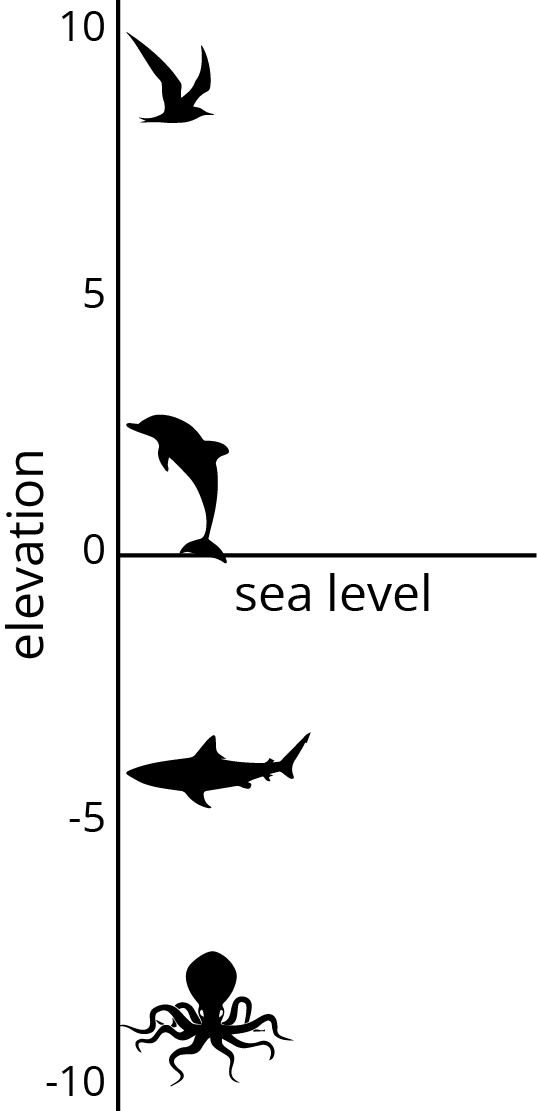Lesson 1
Positive and Negative Numbers
Let’s explore how we represent temperatures and elevations.
1.1: Notice and Wonder: Memphis and Bangor

What do you notice? What do you wonder?
1.2: Above and Below Zero
1. Here are three situations involving changes in temperature. Represent each change on the applet, and draw it on a number line. Then, answer the question.
-
At noon, the temperature was 5 degrees Celsius. By late afternoon, it has risen 6 degrees Celsius. What was the temperature late in the afternoon?
-
The temperature was 8 degrees Celsius at midnight. By dawn, it has dropped 12 degrees Celsius. What was the temperature at dawn?
-
Water freezes at 0 degrees Celsius, but the freezing temperature can be lowered by adding salt to the water. A student discovered that adding half a cup of salt to a gallon of water lowers its freezing temperature by 7 degrees Celsius. What is the freezing temperature of the gallon of salt water?
2. Discuss with a partner:
-
How did you name the resulting temperature in each situation? Did both of you refer to each resulting temperature by the same name or different names?
-
What does it mean when the resulting temperature is above 0 on the number line? What does it mean when a temperature is below 0?
-
Do numbers below 0 make sense outside of the context of temperature? If you think so, give some examples to show how they make sense. If you don’t think so, give some examples to show otherwise.
1.3: High Places, Low Places
-
Here is a table that shows elevations of various cities.
city elevation (feet) Harrisburg, PA 320 Bethell, IN 1,211 Denver, CO 5,280 Coachella, CA -22 Death Valley, CA -282 New York City, NY 33 Miami, FL 0 - On the list of cities, which city has the second highest elevation?
- How would you describe the elevation of Coachella, CA, in relation to sea level?
- How would you describe the elevation of Death Valley, CA, in relation to sea level?
- If you are standing on a beach right next to the ocean, what is your elevation?
- How would you describe the elevation of Miami, FL?
-
A city has a higher elevation than Coachella, CA. Select all numbers that could represent the city’s elevation. Be prepared to explain your reasoning.
- -11 feet
- -35 feet
- 4 feet
- -8 feet
- 0 feet
-
Here are two tables that show the elevations of highest points on land and lowest points in the ocean. Distances are measured from sea level. Drag the points marking the mountains and trenches to the vertical number line and answer the questions.
point mountain continent elevation (meters) C Everest Asia 8,848 H Kilimanjaro Africa 5,895 E Denali North America 6,168 A Pikchu Pikchu South America 5,664 point trench ocean elevation (meters) F Mariana Trench Pacific -11,033 B Puerto Rico Trench Atlantic -8,600 D Tonga Trench Pacific -10,882 G Sunda Trench Indian -7,725 - Which point in the ocean is the lowest in the world? What is its elevation?
- Which mountain is the highest in the world? What is its elevation?
- If you plot the elevations of the mountains and trenches on a vertical number line, what would 0 represent? What would points above 0 represent? What about points below 0?
- Which is farther from sea level: the deepest point in the ocean, or the top of the highest mountain in the world? Explain.
A spider spins a web in the following way:
- It starts at sea level.
- It moves up one inch in the first minute.
- It moves down two inches in the second minute.
- It moves up three inches in the third minute.
- It moves down four inches in the fourth minute.
Assuming that the pattern continues, what will the spider’s elevation be after an hour has passed?
Summary
Positive numbers are numbers that are greater than 0. Negative numbers are numbers that are less than zero. The meaning of a negative number in a context depends on the meaning of zero in that context.
For example, if we measure temperatures in degrees Celsius, then 0 degrees Celsius corresponds to the temperature at which water freezes.
In this context, positive temperatures are warmer than the freezing point and negative temperatures are colder than the freezing point. A temperature of -6 degrees Celsius means that it is 6 degrees away from 0 and it is less than 0. This thermometer shows a temperature of -6 degrees Celsius.
If the temperature rises a few degrees and gets very close to 0 degrees without reaching it, the temperature is still a negative number.

Another example is elevation, which is a distance above or below sea level. An elevation of 0 refers to the sea level. Positive elevations are higher than sea level, and negative elevations are lower than sea level.

Glossary Entries
- negative number
A negative number is a number that is less than zero. On a horizontal number line, negative numbers are usually shown to the left of 0.

- positive number
A positive number is a number that is greater than zero. On a horizontal number line, positive numbers are usually shown to the right of 0.
